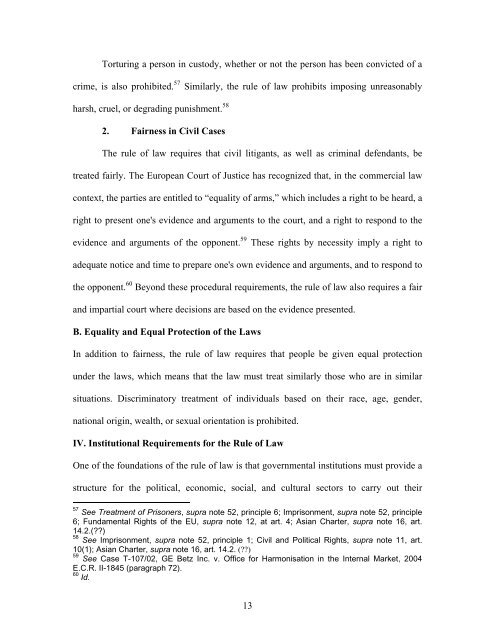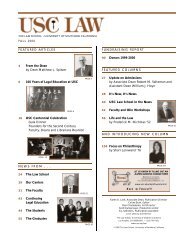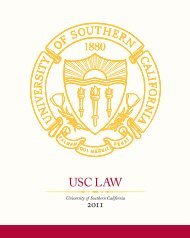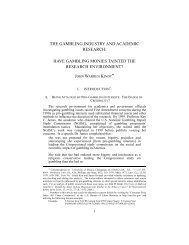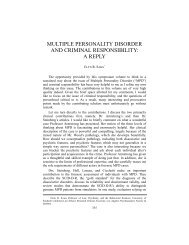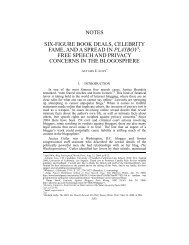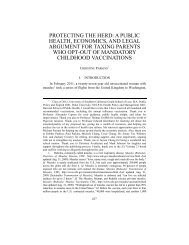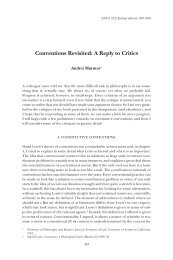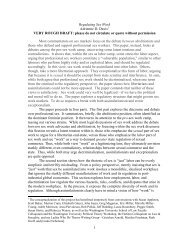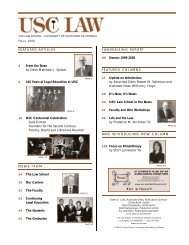Bufford Defining the Rule of Law
Bufford Defining the Rule of Law
Bufford Defining the Rule of Law
You also want an ePaper? Increase the reach of your titles
YUMPU automatically turns print PDFs into web optimized ePapers that Google loves.
Torturing a person in custody, whe<strong>the</strong>r or not <strong>the</strong> person has been convicted <strong>of</strong> a<br />
crime, is also prohibited. 57 Similarly, <strong>the</strong> rule <strong>of</strong> law prohibits imposing unreasonably<br />
harsh, cruel, or degrading punishment. 58<br />
2. Fairness in Civil Cases<br />
The rule <strong>of</strong> law requires that civil litigants, as well as criminal defendants, be<br />
treated fairly. The European Court <strong>of</strong> Justice has recognized that, in <strong>the</strong> commercial law<br />
context, <strong>the</strong> parties are entitled to “equality <strong>of</strong> arms,” which includes a right to be heard, a<br />
right to present one's evidence and arguments to <strong>the</strong> court, and a right to respond to <strong>the</strong><br />
evidence and arguments <strong>of</strong> <strong>the</strong> opponent. 59 These rights by necessity imply a right to<br />
adequate notice and time to prepare one's own evidence and arguments, and to respond to<br />
<strong>the</strong> opponent. 60 Beyond <strong>the</strong>se procedural requirements, <strong>the</strong> rule <strong>of</strong> law also requires a fair<br />
and impartial court where decisions are based on <strong>the</strong> evidence presented.<br />
B. Equality and Equal Protection <strong>of</strong> <strong>the</strong> <strong>Law</strong>s<br />
In addition to fairness, <strong>the</strong> rule <strong>of</strong> law requires that people be given equal protection<br />
under <strong>the</strong> laws, which means that <strong>the</strong> law must treat similarly those who are in similar<br />
situations. Discriminatory treatment <strong>of</strong> individuals based on <strong>the</strong>ir race, age, gender,<br />
national origin, wealth, or sexual orientation is prohibited.<br />
IV. Institutional Requirements for <strong>the</strong> <strong>Rule</strong> <strong>of</strong> <strong>Law</strong><br />
One <strong>of</strong> <strong>the</strong> foundations <strong>of</strong> <strong>the</strong> rule <strong>of</strong> law is that governmental institutions must provide a<br />
structure for <strong>the</strong> political, economic, social, and cultural sectors to carry out <strong>the</strong>ir<br />
57<br />
See Treatment <strong>of</strong> Prisoners, supra note 52, principle 6; Imprisonment, supra note 52, principle<br />
6; Fundamental Rights <strong>of</strong> <strong>the</strong> EU, supra note 12, at art. 4; Asian Charter, supra note 16, art.<br />
14.2.(??)<br />
58<br />
See Imprisonment, supra note 52, principle 1; Civil and Political Rights, supra note 11, art.<br />
10(1); Asian Charter, supra note 16, art. 14.2. (??)<br />
59<br />
See Case T-107/02, GE Betz Inc. v. Office for Harmonisation in <strong>the</strong> Internal Market, 2004<br />
E.C.R. II-1845 (paragraph 72).<br />
60<br />
Id.<br />
13


